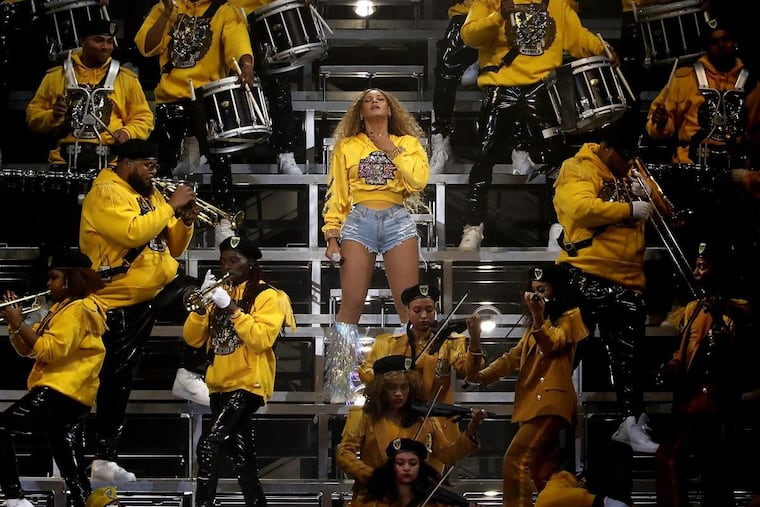After paying homage to black culture at 'Beychella', Beyoncé donates $100k to HBCUs
On Saturday night, Beyoncė became the first black woman to headline a Coachella set in the music festival's 19-year history.

Beyoncé declared ownership of the Coachella stage with quite possibly the best performance the festival has ever seen.
On Saturday night, Beyoncé became the first black woman to headline a Coachella set in the music festival's 19-year history. As the world watched, Beyoncé delivered an ambitious two-hour show that celebrated the many facets of the black diaspora.
Queen Bey followed that Monday by announcing that she would be donating $100,000 to four Historically Black Colleges and Universities (HBCUs), the Associated Press reported. Through her BeyGOOD initiative, the singer plans to give $25,000 to one student each from Bethune-Cookman University, Tuskegee University, Xavier University of Louisiana and Wilberforce University.
Her Saturday performance started with a snare drum roll. After a brief cadence count, Beyoncé appeared dressed in a lavish metallic and crystal-encrusted Balmain leotard paired with Nefertiti-inspired headpiece. To the sounds of a soulful southern marching band, Beyoncé made her way to the stage in a manner that said, "I'm back!" (She pulled out of last year's Coachella lineup because of her pregnancy; she gave birth to twins in June.)
On a set that resembled bleachers in a football stadium, it was clear that Beyoncé was paying homage to southern marching bands at HBCUs. But as the show went on, the marching band theme expanded from music to HBCU culture in a general sense by employing a dancing style called stepping that's used by historically black fraternities and sororities. A vibrant yellow-and-black color scheme, a play on Beyoncé's alias "Queen Bey," blanketed the stadium-like seating on stage.
Nearly every song that Beyoncé performed was underscored by the funky and gritty brass sound of the live band. From the heavy-drummed Fela Kuti rhythms to the sultry sounds of the Caribbean and New Orleans, to the chopped and screwed DJing technique of Houston, Beyoncé weaved myriad references of the diaspora into one show. There also was a focus on body positivity, with dancers and musicians of all body types.
Instead of relying on more mainstream inspiration, like Tina Turner or Donna Summer, Beyoncé's Coachella set was heavily saturated with obscure references to black culture with songs from Juvenile, Master P., Crucial Conflict, Fela Kuti, and New Orleans' "second-line" versions of her songs.
In a tender moment between songs, Beyoncé said that she "dreamed up" this show while pregnant. By performing such a show in front of a traditionally white audience, she made clear that she needs no permission to be black, to be profane, to take charge — even, perhaps, to rename Coachella.
In between songs, the voice of DJ Khaled blared through the speakers to declare that Coachella should be renamed "Beychella" — as in, no artist will ever surpass Beyoncé's Coachella moment.
The performance reached a high point with the reunion of Destiny's Child. Former band members Kelly Rowland and Michelle Williams joined Beyoncé for a short medley of "Lose My Breath," "Say My Name," and "Soldier." It's been 14 years since their last studio album and five years since the group performed at the Super Bowl in New Orleans, but the clarity of their voices and tight choreography proved that the ladies still had it. Later in the show, Beyoncé's younger sister Solange Knowles took to the stage for a dance break to "Get Me Bodied," which was drenched with sisterly affection.
Beyoncé lives her lyrics. She is a boss, and she empowers women to love themselves and to seek independence in their own ways. This is not new. But what made this Coachella performance so special was its authenticity and dedication to show black culture in an intricate way. It was rowdy. It was rough. It was fun, and that was shown through the joyous expressions on every face over which the cameras panned.
With her generous donation to HBCUs, Beyoncé is making a strong statement on issues of race and diversity. The donation helps carry the momentum of her Coachella set into support for furthering the education of young black students.
The Coachella stage is now Beyoncé's stage.